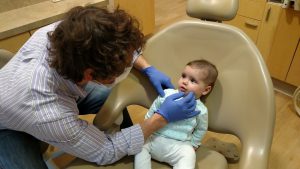How to Care for a Child’s Teeth

At Eastern Virginia Family & Cosmetic Dentistry, our cosmetic dentists provide oral health care for patients of any age. Oftentimes, new parents will ask our experienced dentists how to best care for their young child’s teeth and gums. Below are some tips to start your child on a lifetime of good oral hygiene.
Tooth and Gum Care
Our dentists recommend patients schedule an oral health exam for their child either after the first tooth appears, or within the first year. For infants, a damp cloth should be used to clean the child’s gum tissue. Spiffies® Tooth wipes are a great tool that can be used to clean the teeth of infants 3 months and older. The wipes can be rubbed on children’s teeth and gums after meals or before bed to reduce bacteria and the chance of developing cavities. A small toothbrush, such as the Radius®, can be used to gently brush the teeth. For children under 3, a tiny smear of fluoride toothpaste should be used (no larger than a grain of rice) during brushing. Children between the ages of 3 and 6 can use a pea-sized amount of toothpaste. In early childhood, children who need a bottle before bed should drink only water or have their teeth cleaned afterward.
Teething
By six months, your baby will likely have one or more teeth. Oftentimes, the lower central incisors are among the first to appear. Tender, sore gums are common while the first set of teeth grow through the gum tissue, which can cause irritability and a desire to chew on objects at hand. A low-grade fever and increased drooling are also common during the teething process. To sooth a child who is teething, a cool, wet, clean piece of gauze can be rubbed along the gums. Teething rings can also provide relief for an infant experiencing tenderness or discomfort, though our dentists suggest that teething rings should never be dipped or coated in food of any kind. Over-the-counter pain relievers are another option which can help with teething symptoms; they should be administered according to the manufacturer’s instructions, and if there are any questions you should call the pediatrician. Finally, it is imperative that you do not administer any gel or cream containing a local anesthetic to prevent serious reactions or problematic ingestion.
Pacifiers and Thumb Sucking
Though sucking a pacifier or thumb is normal behavior, it is important to wean children off of these habits by the time they are three years old. Oral health problems can develop as a result if these behaviors are allowed to continue. A small oral appliance can aid parents in this type of behavior training when necessary.
Our dentists believe educating new parents about pediatric dental health can help set up their children for a future of healthy teeth and beautiful smiles.
To learn more about pediatric dentistry or to schedule an appointment with one of our dentists, please contact our practice today.